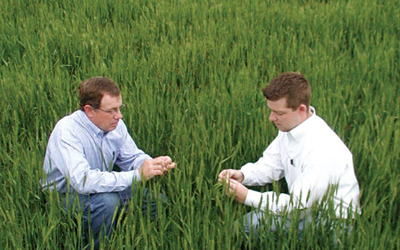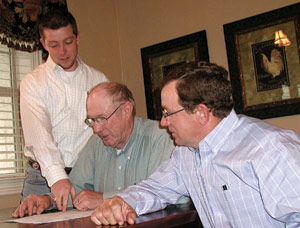
Bruce Wetzel heaved a sigh of relief when his son, Chad, came back to the farm three years ago.
“Chad’s so much better (than I am) at tracking,” says Bruce, who farms near Sherman, Texas, north of Dallas. “It’s relieved a lot of stress for me.”
When you grow 4,000 acres of corn and 2,000 acres of wheat like the Wetzels do, keeping track of inputs, expenses, yields, storage locations, deliveries and sales is critical. For years, Bruce kept records in hand-written ledgers. “I was always behind,” he says.
Now, thanks to Chad’s computer savvy, the farm’s entire recordkeeping system is computerized. Even more significant, the Wetzels, like many father-son teams, have combined their individual strengths and skills to diversify and take the operation to new levels of efficiency and productivity.
Chad was a youngster when he started helping his dad. He continued to work on the farm on weekends and holidays while attending Texas Tech University in Lubbock. He also helped out while working for the nearby City of Corinth after graduating in 1995.
“It was in the back of my mind to come home,” Chad says. “It’s in my blood. I’m not fond of traffic and living in the city.”
With a degree in finance and a penchant for data management, Chad soon carved a niche in the family business. He keeps a spreadsheet for each crop and each farm, tracking acres, varieties and the dates when fields were planted, tilled, sprayed, fertilized and harvested. He logs where each field’s crop was sold and the selling price. And he gleans global positioning system (GPS) data from farm equipment to analyze yields and soil needs, as well as to check grain markets using the Internet connection on his smart phone.
Because the Wetzels lease more than half of their acreage, and because 50 percent of those leases is based on profit-sharing, it’s crucial that they track their profitability.
Making a Strong Team Stronger
Troy Ashby, senior loan officer with AgriLand Farm Credit, has handled the Wetzels’ loans for 18 years. Bruce is an outstanding producer, he notes, and Chad makes the team even stronger. “Chad’s bookwork frees up Bruce to do what he does best,” Troy says.
Bruce usually works outside, while Chad spends much of his time in the office. But with thousands of acres to work, Chad also puts in his share of field time. Bruce bought out brother Marc’s share 10 years ago, and Marc continues to work on the farm, along with two other men who have been with the Wetzels for decades. “We don’t have to tell them what to do — they know what to do,” Chad says. The family hires seasonal workers, and Bruce’s wife, Bobby, also contributes to the farm work.
It took the team most of March to plant corn using two 24-row planters. In years when their corn is rained out or doesn’t emerge, they replant with milo or soybeans. Come fall, they sow soft red winter wheat.
They began using GPS auto-steer technology on corn five years ago. “Auto-steer takes the stress off keeping rows straight,” Chad laughs. “With enough coffee, you can work into the night.” Today, GPS also saves seed costs by eliminating overlap and tracks which varieties yield more.
Similarly, they rely on GPS in their 90-foot-boom, self-propelled spraying rig, which covers 25,000 acres a year, for more precise chemical application and to reduce the need for cultivation.
For five years, Bruce has experimented with no-till methods on 400 acres of wheat and corn rotation. “We’re not real excited about it,” he reports. “Our soil is sticky black clay, and no-till works better on loam. We’ve got a narrow window of opportunity to plant, and our ground is usually too hard or wet.”
New Markets for Wheat Straw
Success today requires flexibility, whether it’s choosing the right crops and methods or selling at the right price. In the past, Bruce planted the farm half to corn and half to wheat, but higher corn prices sparked a move toward more corn.
“The Wetzels don’t just sell corn and wheat — they market it,” says Troy.

Bruce Wetzel, right, and son Chad, left, go over the farm records with AgriLand Senior Loan Officer Troy Ashby. When they’re not farming, Bruce flies helicopters, and Chad races motorcycles for fun.
With financing from AgriLand, they constructed four 50,000-bushel grain bins, so that they can hold their crops until market conditions are right, rather than selling at harvest time or paying others for storage.
“There’s so much advantage to marketing it yourself rather than selling it to the local elevator,” Bruce says. Most of their corn goes directly to chicken and dairy farms or feed mills.
The Wetzels haul grain from the field with their own semi trucks and trailers, and each week, they truck giant bales of wheat straw — normally considered a waste product — to Madisonville in east-central Texas. There, it’s used as bedding for growing mushrooms. To make the trips more profitable, they recently began backhauling used mushroom compost and spreading it on their own fields or marketing it to gardeners. The family also sells straw to a company that constructs homes and buildings from straw bales.
Even though they grow so much wheat, Bruce and Chad don’t graze their herd of 30 Brangus cows on winter wheat; on their soil, the cattle would trample the plants too much.
Partnering With Farm Credit
Back before insects contributed to the decline in cotton acreage in north Texas, Bruce’s dad grew 200 to 300 acres of cotton on the home place. The family has come a long way since then, with Bruce adding corn and wheat acreage almost every year until three years ago, when he leveled off at 6,000 acres of crops and began to focus more on effective marketing and lower-cost production.
“I felt if we didn’t get bigger, we couldn’t survive,” he says.
A key partner in the Wetzels’ business is AgriLand Farm Credit. “They’ve stuck with us through good times and bad,” Bruce says.
Chad likes working with a banker like Troy, who has an agricultural background. “He knows how risky agriculture can be, and that it takes a lot of input to get any output,” Chad says.
The recent credit crisis has caused lenders, including AgriLand, to make some changes. “We’re all looking at credit more closely,” Troy says. “But at Farm Credit, we still make good loans to good customers.”
Looking to the future, Bruce and Chad say they will continue to look for new ways to cut costs and boost profits. They hope to add more GPS equipment. And Chad never stops learning. He attends a nearby college at night, where he is pursuing his master’s degree in business administration. He’s also part of a National Association of Wheat Growers’ leadership program, and every day he shares ideas on farm policy and best practices with other farmers he meets online through social networks like LinkedIn.
Bruce and Bobby’s other son, Paul, and his wife, Connie, have a baby daughter, Haley. Bruce holds out hope that Paul, now in the Army and seemingly headed for a medical career, might return to farming.
“It’s a good way of life, and a good place to raise kids,” Bruce says.
His sons are proof of that.
– Nancy Jorgensen